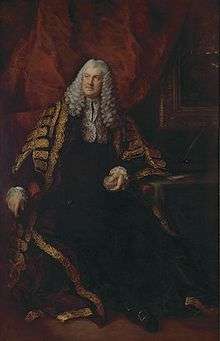Charles Wolfran Cornwall
| The Right Honourable Charles Wolfran Cornwall | |
|---|---|
 Portrait by Thomas Gainsborough | |
| Speaker of the British House of Commons | |
|
In office 1780–1789 | |
| Monarch | George III |
| Preceded by | Fletcher Norton |
| Succeeded by | William Grenville |
Charles Wolfran Cornwall (15 June 1735 – 2 January 1789) was a British politician who became Speaker of the House of Commons.[1]
Origins and early life
Charles Wolfran Cornwall was born on 15 June 1735, the only son of Jacobs Cornwall and Elizabeth Forder, and baptised at St Thomas's church in Winchester ten days later.[2] His parents were third cousins, both being great-great-grandchildren of Humphrey Cornewall,[3] and he was given the names of two other family members: his paternal grandfather Admiral Charles Cornewall and his maternal great-grandfather Captain Wolfran Cornewall. Jacobs Cornwall died the following year, on 8 August 1736.
Despite the naval associations of his namesakes, young Charles Wolfran was raised for a career in the law. He began his education at Winchester in 1748,[4] going on to New College, Oxford.[1] He started his legal training at Lincoln's Inn in 1755 before being called to the bar at Gray's Inn two years later.[4]
Career
In 1768, he was returned as MP for Grampound. He was created a Privy Councillor in 1780.[5]
As Speaker of the British House of Commons, Cornwall achieved notoriety for keeping a large (and replenished) stock of porter beneath the Speaker's Chair, with which he would, frequently and without shame, succour himself when (as happened very often) the debates grew too boring for him. His portrait by Gainsborough shown here is one of the artist's few political portraits and is now in the National Gallery of Victoria, Australia. It originally hung in the family seat, Moccas Court, Herefordshire, a lovely and once secluded 18th-century house redesigned by Anthony Keck in the 1770s including work by Adam. It overlooks the River Wye. It is now a luxury hotel, reception venue and conference centre.
He is buried in the chapel of the Hospital of St Cross, Winchester with a monument by John Francis Moore.[6][7]
References
- 1 2
 Hunt, William (1887). "Cornwall, Charles Wolfran". In Stephen, Leslie. Dictionary of National Biography. 12. London: Smith, Elder & Co.
Hunt, William (1887). "Cornwall, Charles Wolfran". In Stephen, Leslie. Dictionary of National Biography. 12. London: Smith, Elder & Co. - ↑ Foljambe, Cecil George; Reade, Compton (1908). The House of Cornewall. Hereford: Jakeman and Carver. pp. 95–98.
- ↑ Determined from family trees in Foljambe & Reade
- 1 2 "Cornwall, Charles Wolfran". Oxford Dictionary of National Biography (online ed.). Oxford University Press. doi:10.1093/ref:odnb/6335. (Subscription or UK public library membership required.)
- ↑ Brooke, John (1964). "Cornwall, Chalres Wolfran (1735-1789)". In Namier, Sir Lewis; Brooke, John. The House of Commons 1754-1790. The History of Parliament Trust.
- ↑ Dictionary of British Sculptors, 1660-1851, by Rupert Gunnis
- ↑ Humbert, Lewis Macnaughten (1868). Memorials of the Hospital of St. Cross and Alms House of Noble Poverty. London: Parker & Co. pp. 50–51.
| Parliament of Great Britain | ||
|---|---|---|
| Preceded by Merrick Burrell Simon Fanshaw |
Member for Grampound 1768–1774 With: Grey Cooper |
Succeeded by Sir Joseph Yorke Richard Neville |
| Preceded by Arnold Nesbitt William Nedham |
Member for Winchelsea 1774–1784 With: Arnold Nesbitt 1774–75 William Nedham 1775–80 John Nesbitt 1780–84 |
Succeeded by John Nesbitt William Nedham |
| Preceded by William Dickinson Thomas Onslow |
Member for Rye 1784–1789 With: William Dickinson |
Succeeded by William Dickinson Charles Long |
| Political offices | ||
| Preceded by Fletcher Norton |
Speaker of the House of Commons 1780–1789 |
Succeeded by William Grenville |
| Legal offices | ||
| Preceded by Thomas, 2nd Lord Lyttelton |
Justice in Eyre north of the Trent 1780–1789 |
Succeeded by The Viscount Falmouth |
.svg.png)